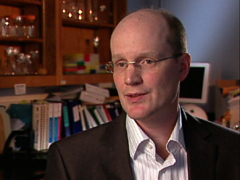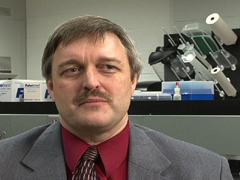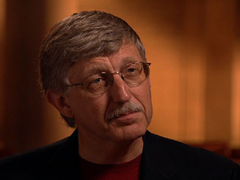In This Episode << SLIDE LEFT TO SEE ADDITIONAL SEGMENTS
Darwin at 200
BOB ABERNETHY, anchor: Next Thursday, February 12, is the 200th anniversary of the birth of Abraham Lincoln, and there will be many celebrations of his achievements. It’s also the 200th birthday of Charles Darwin, and this year is the 150th anniversary of his transforming book “On the Origin of Species.” We have a special report today on Darwin’s theory of evolution. That insight is almost universally accepted by scientists. But it directly contradicts the Bible’s creation story, and so it remains under attack by many people of faith. Indeed, Americans are almost evenly divided between those who accept Darwin’s theory and those who do not. Why is evolution still such a controversial idea? Fred de Sam Lazaro reports.
FRED DE SAM LAZARO: In the 1830s Darwin collected data on the vast variety of living things while he was a naturalist with the British navy on a five-year trip around the world. He later theorized that the earth was very old — that all life had evolved from simple organisms to the most complex. It followed that all humankind had evolved from a single ape-like ancestor. Kenneth Miller is a professor at Brown University.
Professor KENNETH MILLER (Division of Biology and Medicine, Brown University): Evolution is a great idea, but it’s also a dangerous idea. It’s an idea that threatens people’s understanding of the way things are, and for a century and a half people who are bothered by that idea have never stopped hoping that Darwin might turn out to be spectacularly, colossally, totally and completely wrong.
DE SAM LAZARO: Francis Collins is an evangelical Christian who led the Human Genome Project to decipher the genetic code.
Dr. FRANCIS COLLINS (Geneticist): There is no greater flashpoint right now in the tensions between science and faith than evolution. Ever since Darwin’s “Origin of the Species” was published that tension has been flaring, and it seems, in my view, to be getting almost worse even after all of these years.
DE SAM LAZARO: Over many years of debate, people who accepted without question the Bible’s account of God’s creation, those sometimes called creationists, said Darwin’s theory was heresy. Loren Haarsma teaches physics at Calvin College in Michigan and is the author of a new book called “Origins.”
Professor LOREN HAARSMA (Physics and Astronomy Department, Calvin College): Many people are raised to believe a certain interpretation of Genesis, which is mostly literal, not completely literal, but implies a young Earth, and most people when they hear the Genesis story of God creating everything, they picture God miraculously creating everything.
DE SAM LAZARO: For come Christians, evolution came to be a synonym for atheism.
Prof. HAARSMA: There are Christians who agree that evolution equals atheism, and since they believe in God, since they’re convinced that God is real from their experiences of reading the Bible and worship, prayer, if God is true they conclude evolution must be false. So that idea that you have to choose between evolution or God is, I think, the main source of the problem — the main reason why this issue keeps coming up over and over again.
DE SAM LAZARO: Some scientists also say part of the problem is misunderstanding about the meaning of the word “theory.” Matthew Hamilton teaches at Georgetown University.
Professor MATTHEW HAMILTON (Georgetown University): That word theory is used very differently in common parlance. e might say something like, “Well, in theory I’m supposed to leave work early today,” and that would be a way of saying, “Well, I hope or I approximately think that this might be true.” But in science a theory is not a guess.
DE SAM LAZARO: For scientists, a theory is a testable explanation of how things work, based on observations and measurements. They say Darwin’s overall theory is the best explanation for the facts, although there do remain some unexplained gaps in the evidence.
Prof. HAARSMA: There are certain Christians who point to those areas and say, “Ah, here’s scientific evidence against evolution.” Scientists are worried about including too much emphasis on the gaps and the unknowns as a way of getting students to simply throw the whole theory out and say, “Ah, well, now I have a reason not to believe it.”
It’s easy to see how evolution can produce variation, how it can produce adaptation to environments. But can it really make more complex life forms? That’s an ongoing area of research. That’s one of those places where we have a gap in our knowledge. We have hints, we have ideas, we have hypotheses. We don’t have a lot of proofs.
The other big unknown, of course, is how did the first life start, and that’s the biggest question of all. Scientists are very far from a robust scientific explanation for how the first living cell came about, and so opponents of evolution point to that and say maybe that’s a place where there was a miracle.
DE SAM LAZARO: Evolution critics use what they see as flaws in the evidence in their continuing but losing campaign to have creationism taught in the schools alongside evolution.
More than 20 years ago, the Supreme Court ruled that creationism could not be taught in science classes, that it was more religion than science, that teaching it in public schools would cross the line of separation between church and state. So creationists turned to other arguments.
(From video): There is, in fact, no entity in the known universe that stores and processes more information more efficiently than the DNA molecule.
DE SAM LAZARO: One of them was that some forms of life are so complex that they must have been designed by an intelligent designer. That was at the heart of testimony in Dover, Pennsylvania.
RICHARD THOMPSON (President and Chief Counsel, Thomas More Law Center, Ann Arbor, MI): We are going to argue that intelligent design is science, it’s not religion.
DE SAM LAZARO: But a federal judge ruled that Intelligent Design is not science and so should not be taught in science classes. This year the battle shifted to Texas, where creationists want the state board of education to continue its longstanding requirement that students examine the “strengths and weaknesses” of all scientific theories including evolution.
STEPHEN C. MEYER (Director and Senior Fellow, Center for Science and Culture Discovery Institute, speaking before Board of Education): Teaching students about the strength and weaknesses of theories will engage their interest and turn a dry recitation of facts and propositions into an educational adventure.
Professor RONALD WETHERINGTON (Anthropology Department, Southern Methodist University, speaking before Board of Education): And I challenge anybody to show me or anyone else specific, identified details on the weaknesses of evolution. Nobody has.
DE SAM LAZARO: Despite the extremes of argument, many people of faith who are also scientists insist that evolution and religious belief need not conflict. For instance, they say God can work through evolution.
Prof. HAARSMA: I think Christians are very — even Christians who oppose the theory of evolution — are comfortable saying God works through natural, scientifically understandable processes. If the majority of Christians could come to the place where they say, “I might or might not believe in evolution, but it’s OK for Christians to believe in evolution,” that would take some of the weight off. On the other side, it would be very helpful if science educators could find better ways to discuss how different religious views might view evolution.
Dr. COLLINS: If God, who is outside space and time, chose to create a universe and populate it with creatures in his image with whom he could have fellowship, who are we to say that the process that we as scientists have uncovered — the Big Bang, the formation of stars and planets and the mechanism of evolution to create life and ultimately human life — is not the way we would have done it? I find that enormously satisfying. Nothing that I know as a scientist is in contradiction to that. Nothing that I know as a believer is in contradiction to that.
DE SAM LAZARO: Meanwhile, the debate continues, creationists versus evolutionists. Next month, the Texas board of education will decide whether the state’s new science curriculum should continue to require discussion in science classes of the strengths and weaknesses of Darwin’s idea. The vote is expected to be close.
For RELIGION & ETHICS NEWSWEEKLY, this is Fred de Sam Lazaro.





